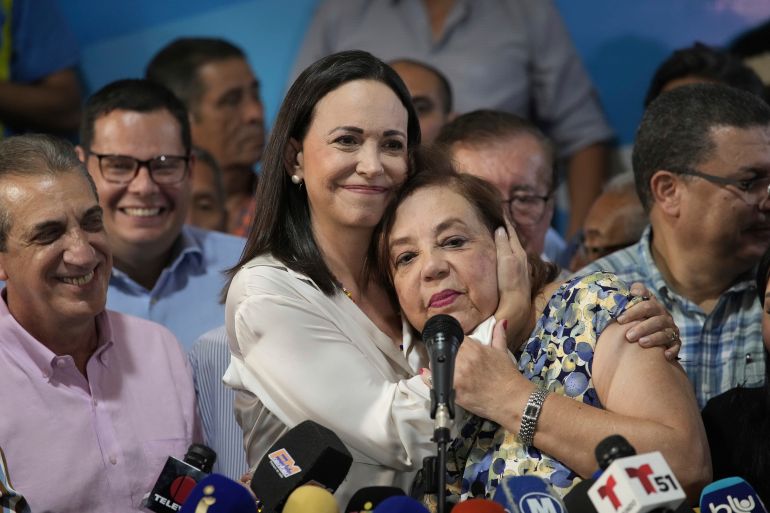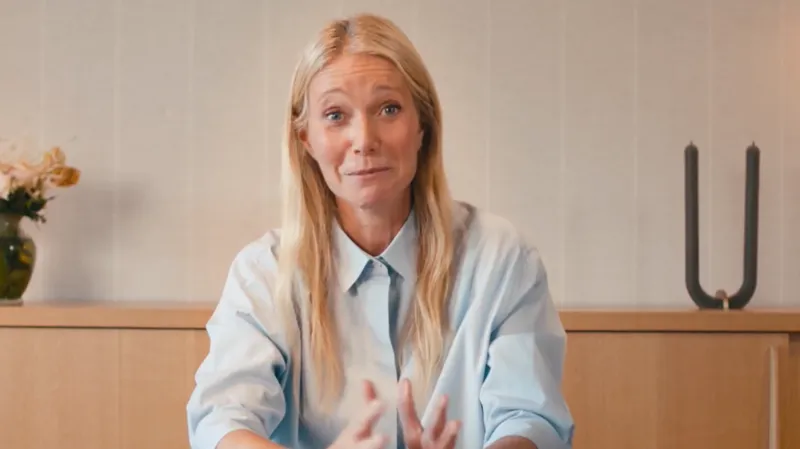Faced with an election ban, Venezuela opposition leader names alternate
Opposition leader María Corina Machado named professor Corina Yoris as her replacement in the 2024 presidential race.

Maria Corina Machado, the opposition leader in Venezuela’s upcoming presidential election, has thrown her support behind an alternate candidate as she continues to face a ban from running for office.
She named the 80-year-old historian and professor Corina Yoris to be her replacement in the July 28 race.
The announcement came on Friday, as the administration of President Nicolas Maduro received international condemnation for its alleged pressure campaign against Machado.
Earlier in the day, the United States Department of State issued a statement condemning the arrests of individuals close to Machado, including two members of her campaign: Dignora Hernandez and Henry Alviarez.
“The decision by Maduro and his representatives to detain two members of the leading opposition candidate’s campaign and issue warrants for seven others represents a disturbing escalation of repression against Venezuela’s opposition parties,” spokesperson Matthew Miller said in a statement.
“We continue to call for the immediate release of all political prisoners.”
Alviarez had served as national coordinator for Machado’s liberal party, Vente Venezuela. Hernandez, meanwhile, was the party’s political secretary.
They both were arrested on Wednesday on conspiracy charges, for allegedly fomenting violence.
Venezuela’s Attorney General Tarek William Saab described them as participating in schemes to attack military installations, among other acts aimed at “destabilising” the country.
Other party members, including Machado’s close associate Magalli Meda, had arrest warrants issued for similar charges.
But Machado has denounced all the charges as “completely false”, and international observers warned Maduro’s administration against attempts to derail the opposition.
Chile’s Ministry of Foreign Affairs, for instance, called the arrests “an action contrary to the democratic spirit that should prevail in any electoral process”.
Human rights organisations have long accused Maduro and his allies of using government forces to violently quash opposition, including through arbitrary arrests and torture.
Machado, a former member of Venezuela’s National Assembly, has herself been banned from holding public office in the country.
In June, the comptroller general announced she was disqualified from running from public office for 15 years, due to her support of US sanctions.
But at the time, Machado was the frontrunner for the opposition primary, and she ultimately won that race in October.
An estimated 2.4 million Venezuelans voted in the primary election, which was designed to select an opponent to Maduro.
Early results showed Machado received over 93 percent of the primary vote, a landslide. She has long been considered a favourite to run against Maduro, who is seeking a third six-year term.
The October opposition primary unfolded as Maduro’s government accepted a deal, known as the Barbados Agreement, to hold a competitive presidential election in 2024, monitored by international observers.
In exchange, the US eased certain sanctions, on the condition that the deal was upheld. It has since reimposed some of those sanctions after a Venezuelan court upheld Machado’s ban in January.
But Machado remained under the ban, even after the Barbados Agreement. And the opposition faced a deadline on Monday to name a candidate to appear on the presidential ballot.
“We are determined to move forward and do what needs to be done to stay on this path and fulfil the mandate – the mandate of almost 3 million Venezuelans, achieved on October 22 with the glorious primaries,” Machado said on Friday in a news conference.
Yoris, for her part, thanked Machado for her trust.
-al jazeera






